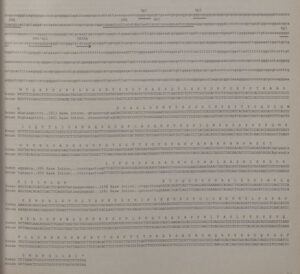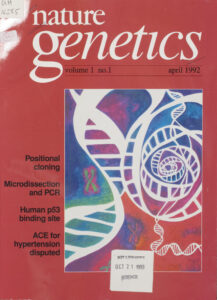The journal Nature first appeared in print in 1869 and ranks among the most prestigious scientific publications in the world.
In the 1970s, as the sciences splintered into more and more refined areas of specialization and as fresh areas of research emerged, Nature began producing offshoot publications, of which Nature Genetics is one. Nature now comprises a large family of tightly focused journals including Nature Geoscience, Nature Climate Change, Nature Medicine, Nature Materials, and many others, reflecting the range and depth of 21st century scientific inquiry.
In 1990 the Human Genome Project was officially launched. By 1992, when this first issue of Nature Genetics appeared, the time was certainly right for a new journal devoted specifically to genetics research.
An international effort, the Human Genome Project was gigantic, complex, and ambitious. But during the course of the project, new technologies emerged that helped speed its progress, and it was actually completed ahead of schedule. By 2003 the project’s original goals had been achieved.

Two institutions closely affiliated with MIT – the Broad Institute and the Whitehead Institute – did important work on the Human Genome Project, the completion of which stands as a major milestone in the history of science.
The very first article in this premiere issue of Nature Genetics is on “positional cloning” and was written by Francis S. Collins, who with Ari Patrinos was one of the two heads of the U.S. arm of the Human Genome Project. Collins has since been named Director of the National Institutes of Health.
Collins’ appointment to lead the NIH was not without controversy. He’s published several books and established a foundation claiming that God created life through evolution. An outspoken advocate for “the harmony of science and faith,” Collins also serves on the Pontifical Academy of Sciences, to which he was appointed by Pope Benedict XVI.

